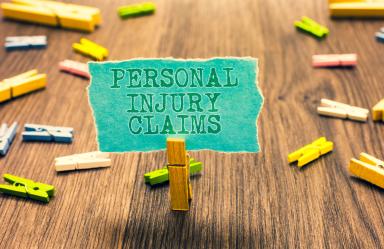Rhode Island Personal Injury Laws

Accidents placed fourth among the leading causes of death in Rhode Island in 2021, following heart disease, cancer, and COVID-19. The Rhode Island Department of Health describes unintentional injuries as “a serious and widespread problem” and a considerable threat to public health but notes that they are nonetheless predictable and preventable.
While the Rhode Island government develops and implements initiatives under its statewide injury prevention plan, residents exercise day-to-day care and vigilance to avert harm to themselves and to other people. In further support, Rhode Island legislation and its judiciary have set strict legal accommodations and protections via personal injury laws, for those who have been injured due to others who do not uphold their duty of care.
This article is an overview of Rhode Island personal injury laws that cover commonly cited incidents, like slips and falls, dog bites, defective product usage, and medical malpractice. It will also run through relevant statutes regarding fault and liability in The Ocean State, in the hope of serving as a guide for personal injury claimants and plaintiffs.
Premises Liability Laws in Rhode Island
Across Rhode Island, owners and managers of property have a duty of care or the responsibility to ensure that their establishment is safe for visitors. A breach of this duty of care—such as when a guest has incurred an injury because the property’s poor conditions were not properly addressed—can spark a personal injury lawsuit that holds the property owner liable to pay for the injured guest’s medical costs and rehabilitation.
In 2019, Rhode Island legislation was amended to offer stronger legal protection to potential plaintiffs. Prior to this amendment, a common defense was that a property’s dangerous state was “open and obvious,” which barred victims from getting compensation.
Negligence remains central to Rhode Island personal injury law even with this amendment. A premises liability claim is stronger if it is proven that the property owner has not taken reasonable measures to preserve their duty of care, from something as straightforward as hanging signage to warn visitors of structural defects to a more thorough repair of dangerous areas. Even if a property owner considers the property defect or danger as open and obvious, they retain the responsibility of keeping visitors safe from those hazards.
Slips and falls are a common focus in premises liability claims, covering injuries caused by poor lighting or wet or slippery floors in a grocery store. The exterior of properties can also be the site of personal injury, with the risks of snow and ice build-up. But premises liability laws extend to all injurious incidents that occur on someone else’s property due to their negligence. Accidents on rental properties and run-ins with aggressive pets are additional examples of incidents that fall under Rhode Island law.
Landlord Responsibilities for Tenant Safety
Under Rhode Island’s Residential Landlord and Tenant Act, landlords must uphold their duty of care and ensure that leased properties are habitable and safe. In addition to adhering to upkeep and maintenance regulations, landlords must carry a general liability insurance policy amounting to at least $100,000. This coverage will pay for tenants’ injuries that have resulted from a landlord’s negligence and/or failure to meet the statute’s provisions.
If an injury occurs on the rental property the injured victim must be able to prove that their landlord was aware (or notified) of the leased property’s dangerous condition and the latter did not take measures to minimize risks or fix the hazards.
Dog Bite Laws: Strict Liability and One-Bite Rules
Penalties for irresponsible pet owners are steep in Rhode Island, where a “strict liability” statute applies to dogs and other domestic animals. Under this statute, the pet owner or the animal’s caretaker bears the responsibility of paying for the injuries and property damage that a pet has inflicted on another person—unless the dog was in the owner’s enclosed area. An “enclosed area” indicates the pet owner’s private property, such as a fenced-in yard.
Simply put, if a dog bites you outside of its owner's private property, like while the dog was being walked, the dog owner is responsible for covering your medical costs.
This also applies if someone else’s dog attacks and injures your dog. Rhode Island considers dogs and other pets property, so the other pet owner could be liable for damage to property and for shouldering veterinary expenses.
However, Rhode Island also follows the “one-bite rule.” If you have been bitten while on the owner’s private property, you have a shot at getting compensation if you can prove that the pet owner has knowledge of their pet’s propensity for biting people. Legally proving a pet’s nature would usually require you to find out if the dog has a history of biting strangers.
The same statute allows for your discovery of the animal’s aggression history to entitle you to higher compensation. If you have been injured by a dog—or “sheep, lamb, cattle, horse, hog, swine, fowl”—that has previously displayed aggressive behavior and injured someone else, you can pursue double damages in civil court.
Injury Claims Against the Rhode Island Government
Seeking compensation after being injured on private property would have you begin with tracking down the property owner, but being injured on public grounds or government-maintained establishments involves a different system. Personal injury claims against a government entity, like a city government, often require an investigation and a few more bureaucratic steps to take.
If you have been injured due to a poorly maintained or defective highway or bridge, you have cause to bring legal action against the Rhode Island town that is in charge of keeping those areas in safe and proper working order. Claimants must notify the town of the injury and its cause, in writing, within 60 days. The state will then launch an investigation, and the town that the claimant notified has 40 days to address the structural defects that led to the injury.
If nothing gets done within those 40 days, then the claimant can turn to the town’s treasury to seek compensation. A lawsuit can be filed within three years, but: all the above prerequisites must have been met, plus recoverable damages from a government entity for defective highways, causeways, or bridges cannot be greater than $100,000.
Product Liability Laws in Rhode Island
Products that make it to the market must have passed through a stringent approval process, and defects that harm a user are grounds for a product liability lawsuit in Rhode Island. A plaintiff may mount their case on any of the following:
Design defect, wherein a flaw in the design of the product makes it dangerous;
Manufacturing defect, wherein a flaw that the product acquired while it was being made makes it dangerous, even if it was designed without that hazard; or
Marketing defect, wherein there were insufficient warnings about the product, or its instructions were incomplete, or it had improper labeling.
A personal injury lawsuit regarding defective products can be based on the defendants’ negligence regarding the above defects or a failure-to-warn claim. But there are also legal claims for breach of warranty, wherein a manufacturer or vendor contradicts statements in the warranty; and strict liability, where a plaintiff does not need to prove either negligence or breach of warranty and the fact that they have been injured stands on its own.
Rhode Island Medical Malpractice Laws
The welfare of patients is a major responsibility for medical professionals and healthcare providers, who are tasked to (at the very least) do no harm, whether at a routine check-up, a prescription refill, or a major surgery. A higher standard of care is in place to help them carry out this duty. When their negligence, mistake, or act of omission injures a patient entrusted to them, state laws step in and balance preserving the integrity of the profession with securing due justice for victims via civil law action.
A plaintiff carries the burden of proof in Rhode Island medical malpractice lawsuits; their case must establish that: 1.) a medical professional owed them a duty of care; 2.) a negligent act, error, or act of omission caused the medical professional to violate that standard of care; 3.) they incurred injuries because a medical professional violated the standard of care; and 4.) their injuries have caused them economic and emotional harm.
Establishing professional negligence requires an assessment by parties well-versed in the medical field. However, only individuals who are legally qualified to testify as expert witnesses can help plaintiffs prove malpractice. Qualifications typically include pertinent education, practical training and experience, and a specialization in the area of medicine that the case is about, and they must receive the presiding judge's approval.
Rhode Island Follows the Pure Comparative Negligence Rule for Personal Injury Lawsuits
For personal injury cases tried in Rhode Island, the court follows the pure comparative negligence system. A plaintiff can pursue compensation for their losses even if they bear some or the majority of the responsibility for the incident that resulted in their injury. Even if they were deemed over 50% or 99% responsible for the incident, they still have a case.
However, the awarded damages are computed according to the plaintiff’s degree of responsibility. If a court awards $100,000 in a personal injury lawsuit, but the proceedings established that the plaintiff was 50% to blame, the compensation they receive is deducted by their share of the fault, or $50,000. If they sought $100,000 but were found to be 99% to blame for the incident that injured them, they would be awarded $1,000 for their losses.
How Much Can Someone Sue For an Injury in Rhode Island?
Rhode Island does not set a cap or limit to the damages that a personal injury plaintiff can pursue.
While the compensation that a plaintiff is awarded remains dependent on the pure comparative negligence system, valuing a personal injury claim still rests on whether the plaintiff is seeking economic or non-economic damages.
Economic vs. non-economic damages
Economic damages (sometimes called special damages in Rhode Island) often compensate for financial losses, such as lost income, medical expenses, out-of-pocket costs to accommodate a disability, and future earning capacity.
Non-economic damages or general damages, on the other hand, aim to assign a value to not-as-easily-quantifiable emotional and psychological losses. Compensation may be sought for pain and suffering, which spans mental trauma and psychological distress, as well as loss of enjoyment of life and loss of companionship.
How will my damages be calculated in Rhode Island?
While computing economic damages tends to be more straightforward, there are a number of factors that Rhode Island personal injury attorneys take into consideration when placing a value on your personal injury claim. Such factors include but are not limited to: t the severity of the injury, length of disability, type of disability, whether total or partial, permanency and scarring. These formulas are not set in stone, and the value of claims differs according to the injury and the negative effects that a plaintiff has had to weather due to the alleged negligence.As another point of reference, the Board of Medical Licensure and Discipline of the Rhode Island Department of Health collated data from medical malpractice claims from 2008 to 2018 to survey cases that were resolved, in part or in whole, via payment to the plaintiff. The survey looked at 460 medical malpractice claims, 48% of which involved specialists in the surgical fields. The mean payment value across these cases was $517,104; meanwhile, 17.6% of the cases involved payment to the plaintiff amounting to over one million dollars. .
The Rhode Island Health Department also has made available online recent medical malpractice settlements, as well as a searchable database, reached by named medical professionals. The agency does caution site visitors that some areas of medical specialization have a higher risk of being the subject of malpractice claims; that some settlements are not proof of the physician’s liability but of an insurer intervening; and that a settlement of a medical malpractice action does not necessarily mean that medical malpractice occurred.
The Statute of Limitations in Rhode Island
Generally speaking, if you wish to file a personal injury lawsuit, Rhode Island sets for potential plaintiffs a deadline of three years from the date of the incident that gave rise to your injury. Going past this deadline often means that your claim cannot be heard in court, barring you from getting due compensation for your losses.
However, the state accounts for how certain injuries or illnesses are not immediately noticeable or symptomatic, so Rhode Island follows the discovery rule. For medical malpractice cases, especially, a plaintiff has the leeway to file a lawsuit three years from the date that the alleged injury or professional negligence was discovered.
For this “extension” to the statute to take effect, the plaintiff must prove that they could not have found out about their injury any sooner, even with “reasonable diligence.” (Another reason why mounting a medical malpractice lawsuit requires competent medical professionals on your side in proving your case.)
Moreover, victims who were minors at the time of the incident must file a lawsuit between the ages of 18 and 21, while victims deemed disabled due to “mental incompetence” have three years after the removal of their disability to sue.
Families of victims of wrongful death have three years from the date of their loved one’s passing to file a lawsuit against negligent parties. If an injured victim, however, passes away within the statute of limitations or within 60 days following the deadline, their administrator can file a lawsuit within one year after their appointment as the deceased’s administrator but not more than three years after the victim’s death.
Legal Resources for Injured Folks in Rhode Island
Rhode Island Community Health Centers
Medical records are an essential part of a plaintiff’s personal injury case, but healthcare is not always accessible. Rhode Island maintains community health centers that provide comprehensive primary care for patients regardless of their income or insurance status. They use a sliding-fee schedule that is based on the patient’s ability to pay. Rhode Island Free Clinic, as an example, provides comprehensive free medical care to residents aged 19 to 64 who are at or 200% below the poverty level.
Rhode Island Bar Association Lawyer Referral Service
The Lawyer Referral Service of the Rhode Island Bar Association connects individuals in need of legal assistance with reputable attorneys. Under the program, a lawyer will hold a 30-minute consultation at no cost. The client will decide whether or not to proceed if extra legal work, at an agreed-upon rate, is necessary. A reduced fee and legal assistance are also available to those who fulfill federally regulated income guidelines. The client has the option of requesting a second reference if the initial lawyer is unable to handle the issue.
RI Judiciary Self-Help Center Public eService Access
The Rhode Island Department of Judiciary is modernizing court proceedings through accessible technologies. Through its electronic filing system, individuals who are representing themselves in court may submit documents remotely. They can also view case information or court records through the public computers located in the state's courthouses. The website’s self-help section also contains court schedules and is capable of criminal information searches.
Expertise.com StaffAuthor
Step into the world of Expertise.com, your go-to hub for credible insights. We don't take accuracy lightly around here. Our squad of expert reviewers, each a maestro in their field, has given the green light to every single article you'll find. From rigorous fact-checking to meticulous evaluations of service providers, we've got it all covered. So feel free to dive in and explore. The information you'll uncover has been stamped with the seal of approval by our top-notch experts.

Louis W. GrandeReviewer
Louis W. Grande aims to provide exceptional legal representation to clients based on the firm’s core values of Experience, Integrity, and Diligence. Since founding his firm in 1990, he has built a thriving practice that focuses on building strong relationships with clients and providing them with the added value they expect and deserve. He has recovered millions of dollars on behalf of injury victims. Visit: https://louisgrande.com/




